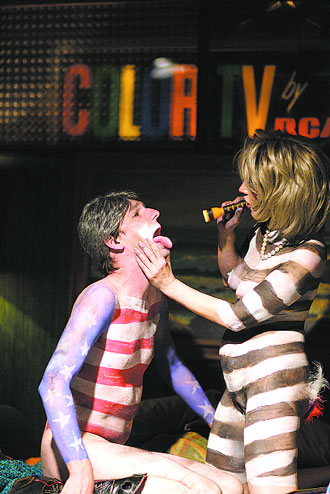Karen Finley busts out again with outrageous tale of George Bush, Martha Stewart
George Washington would no doubt take offense at having his marriage associated with a production that mocks our nation’s current president by depicting him in a tawdry affair. But it takes true diplomats to tackle serious social issues through the construction of an obscene metaphor, as Karen Finley and Neal Medlyn do in their new play, “George & Martha.”
Strangely, the fact that Finley and Medlyn take the stage almost completely naked is not the first thing you notice. The latex body paint, the ridiculous accessories and the actors’ ability to maintain the fourth wall allow Finley, as domestic doyenne Martha Stewart, and Medlyn, as Pres. George W. Bush, to elevate their nudity beyond simple shock value. It seems instead that all artifice has been stripped away for the truth to emerge.
Finley wears a painted-on bodysuit in black and white “prison stripe” style, with gold lame lace-up boots and scarf, and a string of pearls. Medlyn as Bush is painted in red, white and blue, with stars on his arms and legs, the Texas flag on his back, black cowboy boots and a white belt. His penis, covered with red glitter, sits like a bird on the bough of his huge blue balls.
The set, meant to evoke a cheap motel room, is more akin to a basement rumpus room, circa 1979. A sofa bed with orange and teal blankets sits center stage, under a garish oil painting of crashing waves. Flanking the bed are gaudy orange glass lamps perched on pressed wood nightstands, one of which holds a powder-blue push-button telephone. A mirrored bar stands stage left, with taupe leather-padded rails that would make Martha cringe.
“George, it smells in here,” Martha utters, as the pair takes the stage. “Get me a drink.”
The two have met up for a night of kinky extramarital sex—part of an ongoing affair since a drunken encounter at the Rye Hilton in 1975. They turn the television on to the Republican National Convention.
Martha throws a fit when George serves up her drink in a plastic cup, and the two begin a conversation that occasionally becomes violent. George veers into his obsession with his mother, his failed presidency and his failed life, for which he blames his father. Martha’s mind is on the perfect brunch. The exchange devolves until she begins to smother him with a dry cleaning bag, and abruptly pumps his genitals between her breasts, asking for a pearl necklace. It only gets crazier.
Somewhere between his admission of a secret passion for Condoleezza Rice and her declaration that “Martha doesn’t pay a fine because Martha is fine,” an overarching theme emerges—as the two character’s body paint smears together, her stripes into his stars, we see the messy melding of politics and capitalism.
Martha embodies the American success story, with George as her political foil and foe. Martha says, “While you were bombing Mesopotamia, I was thinking about pies… trying to keep my dignity with a stack of index cards and a coat of paint, trying to keep a little bit of beauty in this world of ugly, corrupt political leaders.”
When “the other president” Dick Cheney calls, Stewart answers, and peppers her string of obscenities with promises to work on a gay marriage book with Mary (“Lynne could write the introduction!”). In her brilliant raving, we see Finley at her best.
You keep thinking the scenario cannot get more out of control, but Finley and Medlyn continue to raise the stakes. A sick scene of simulated fellatio during which George repeatedly screams, “Did you ever fuck Bill Clinton?” while Martha’s head bobs between his legs couldn’t be more off the wall. I’ll leave you to discover what uses the two find for a sheepskin blanket, a baby bottle full of beer, a tube of toothpaste and a handful of feathers; suffice it to say, watching someone’s balls being shaved onstage is more than a little unsettling.
Still, all this plays out as somehow not gratuitous. Martha/capitalism longs to adorn the world. When Martha says, “Kmart isn’t Iraq, but that doesn’t mean Iraq can’t be Kmart,” she does Cybill Shepherd proud in her TV movie, “Martha, Inc.” In time, Martha wins Dubya over, as they envision an Iraq of Disney theme parks, of “Micky McJesus in a six-pack on the Gaza Strip.”
Yes, politics is dirty business, but capitalism is no guileless ingenue. As George indignantly discusses political power structures while feathers gently float from his ass, he proves no match for the once innocent, now vitriolic Martha. She attacks his stupidity, compares their situation to “Who’s Afraid of Virginia Woolf?” then mocks him for thinking Edward Albee starred on “Green Acres.”
George accuses Martha of being concerned only with the bottom line. Blows are exchanged; Martha is on the floor now, her legs akimbo on an overturned ottoman. In the end, the puppet president compensates for his lack of compassion through ruthless power. He vows to end Independence Day by removing all freedoms, from freedom of speech to abortion.
Meanwhile, the glorified caterer looks forward to her prison sentence as an opportunity to displace her death wish—“I want to be pulling the trigger, but instead I’m pulling weeds. I want to be slicing my wrists, but instead I’m slicing tomatoes.”
After the show, Finley told Gay City News, “Martha took making decisions out of the man’s world, went outside of the subservient role of the traditional female and people despise her for it.”
“I think Bush is more passive,” she said, “and I think that’s why he is hyper-cruel.”
Medlyn chalked the country’s problems up to our acceptance of necessary evils. “We see George W. Bush and Martha Stewart representing different things about being an American that we might not like, but we feel it is inevitable,” he said. “The nation is saying, ‘This is what we want, he’s not that bad, she’s not that bad.’”
In what she sees as a sick, fetishistic relationship between capitalism and politics, the war in Iraq is, in Finley’s words, “just another market; we are there to make the Middle East a market.”
“George & Martha” tackles heavy issues of filial love, self-loathing, the American success story, politics, war and power. It is positively disgusting, and absolutely mind-blowing. It is avant-garde, risqué and fabulous. At the same time, it makes a powerful statement about that which our nation reveres. Forget the picket signs; if you can stomach what it takes to be a real patriot, get a taste of this show.

































